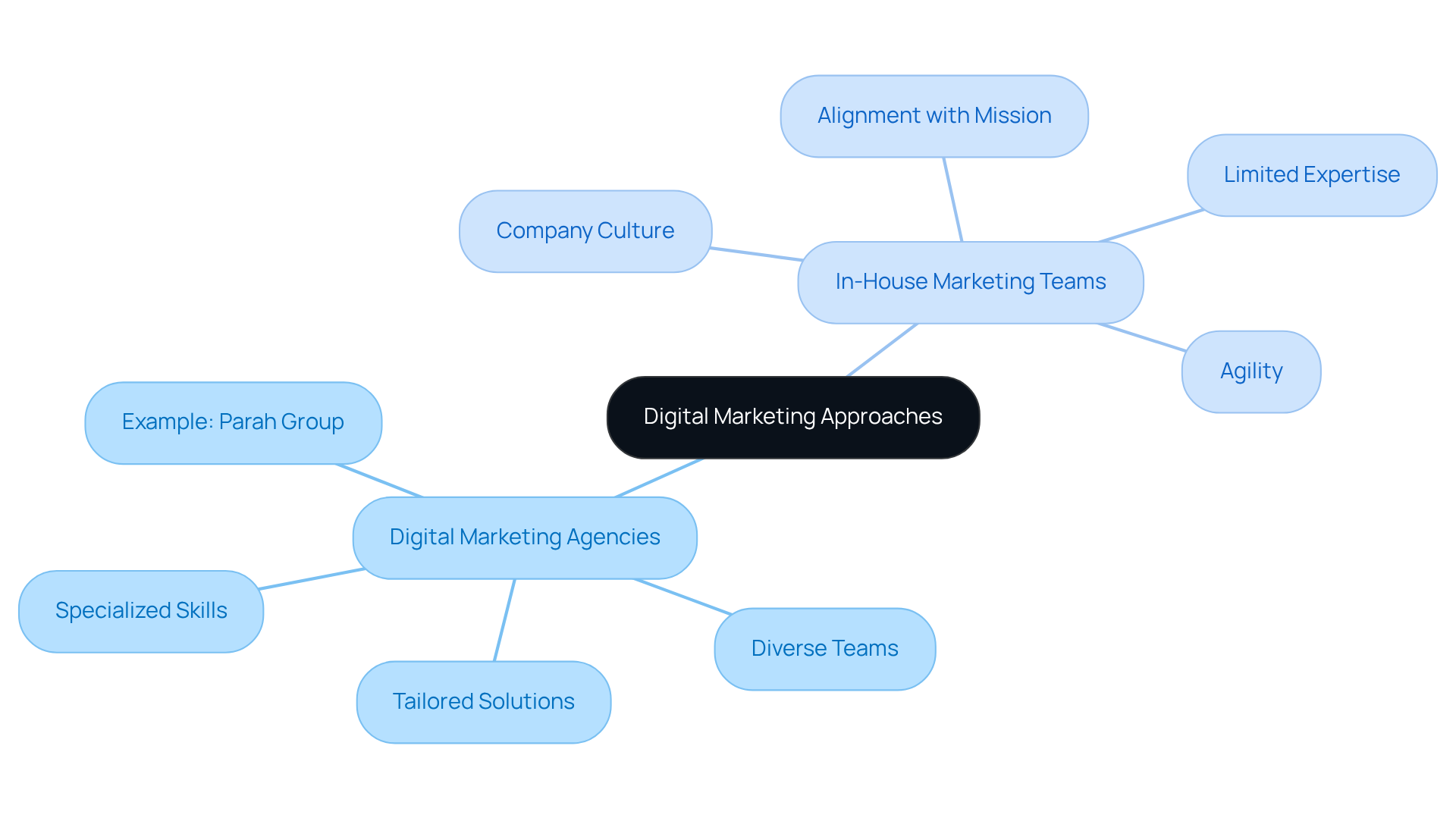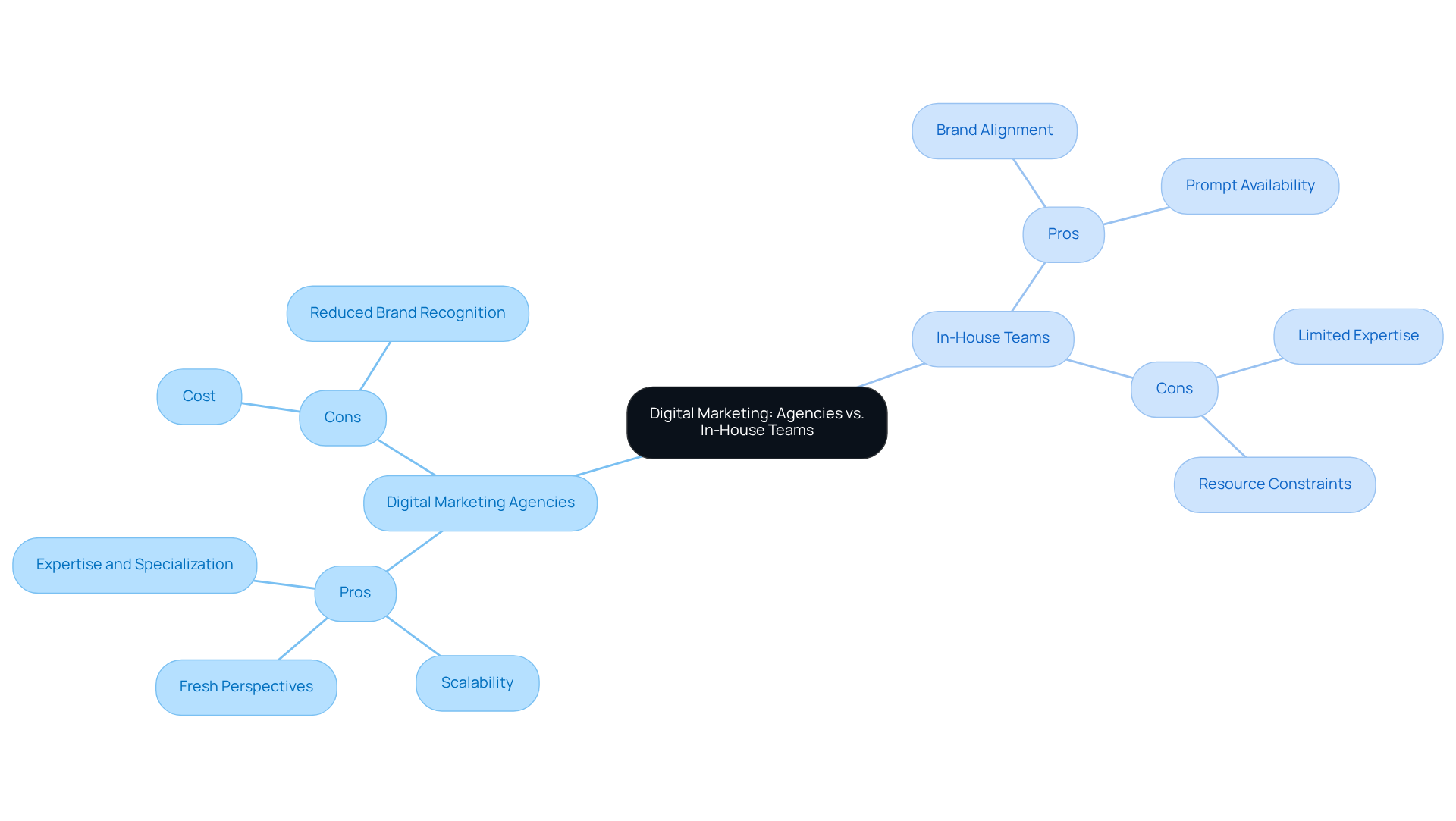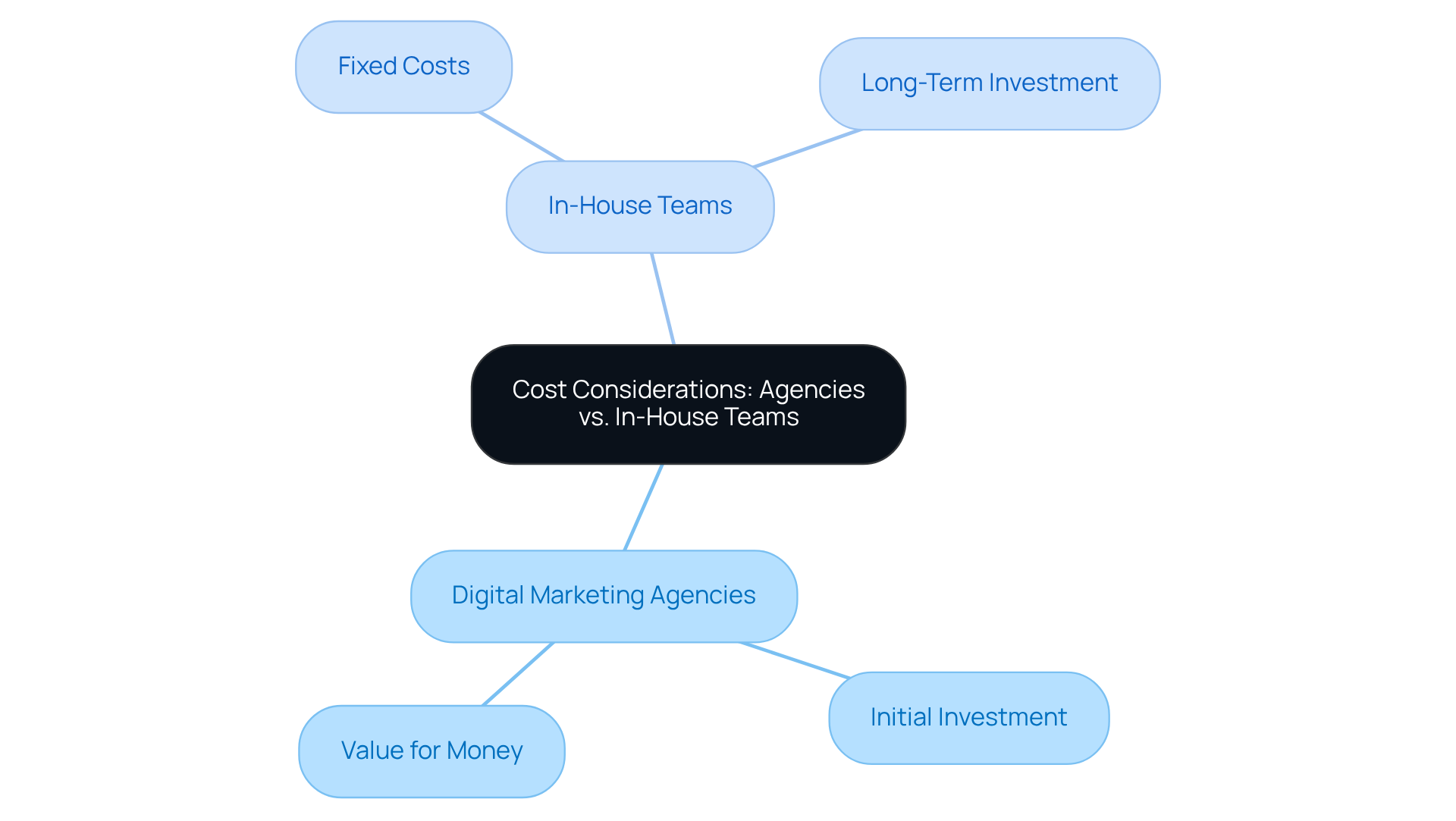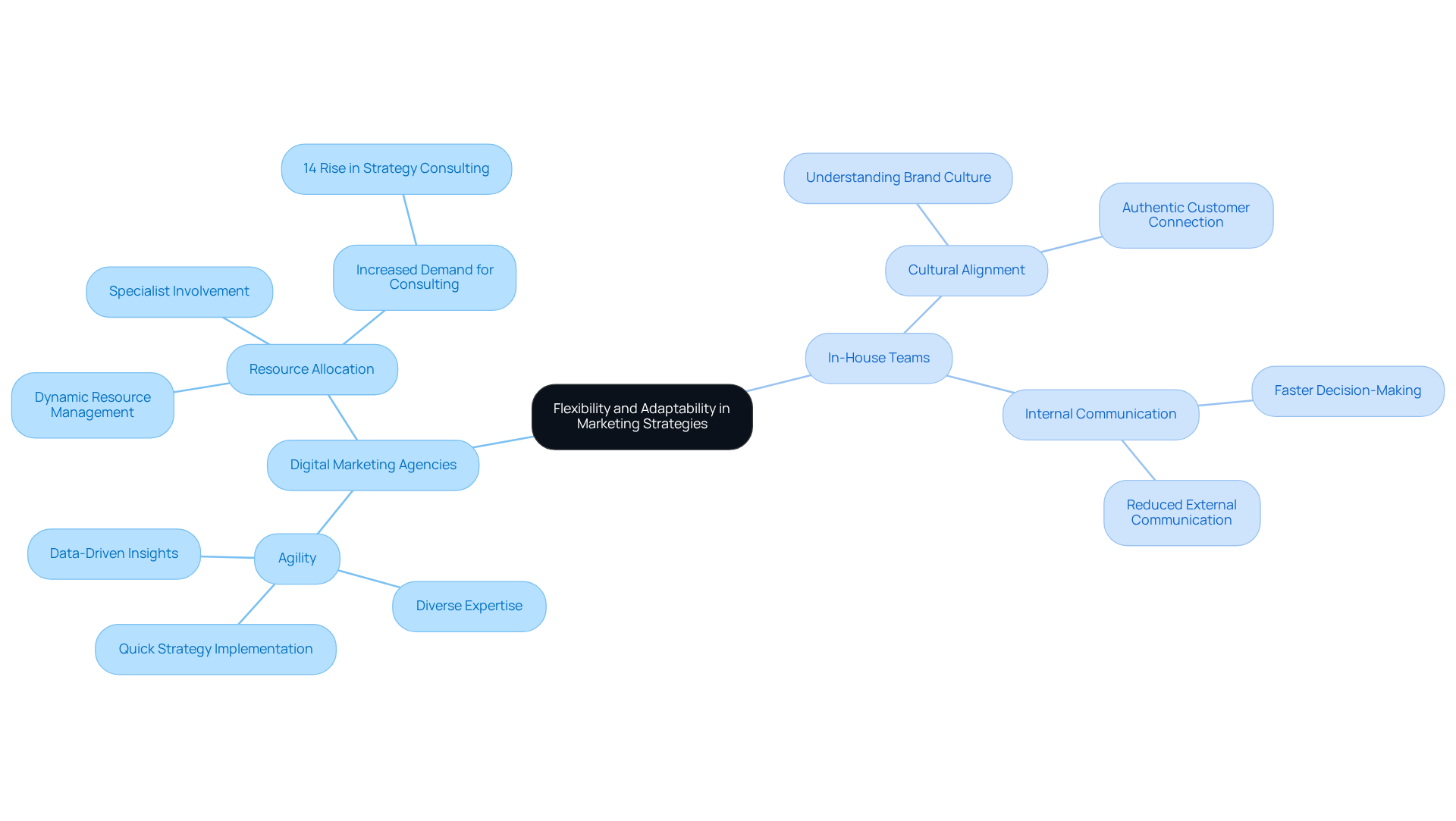
Overview
Digital marketing agencies and in-house teams present unique advantages and disadvantages for direct-to-consumer (DTC) brands, significantly shaping their marketing strategies and overall effectiveness.
- Agencies offer specialized expertise and scalability, which can be pivotal for brands looking to expand rapidly.
- Conversely, in-house teams provide invaluable benefits such as brand alignment and agility, which are crucial for maintaining a coherent brand message.
It is essential for DTC brands to align their marketing approaches with their growth objectives and financial considerations, ensuring that every strategy implemented serves to propel the brand forward.
Introduction
In the rapidly evolving landscape of digital marketing, brands confront a pivotal decision: should they partner with specialized agencies or cultivate in-house teams? Each approach presents distinct advantages and challenges that can significantly influence a company's growth trajectory. This article provides a nuanced comparison between digital marketing agencies and in-house teams, exploring how direct-to-consumer (DTC) brands can strategically align their marketing efforts with their unique objectives.
As companies evaluate the benefits of expertise and scalability against brand alignment and cost considerations, the critical question emerges: which model ultimately fosters greater success in today’s competitive market?
Understanding Digital Marketing Agencies and In-House Marketing
External firms that specialize in delivering a comprehensive array of marketing services, such as SEO, content marketing, social media management, and , are represented by . These digital marketing agencies typically feature diverse teams equipped with specialized skills, enabling them to craft tailored solutions that meet the unique needs of various clients. For instance, organizations like emphasize and to enhance profitability for DTC companies without inflating advertising costs.
Conversely, internal marketing groups consist of personnel who are directly employed by a company. These teams are often more deeply integrated into the company's culture and possess a profound understanding of the organization's mission, values, and customer demographics. While they may not offer the same breadth of expertise as agencies, in-house teams can be more agile and responsive to immediate business requirements, fostering a strong alignment with the overall strategic direction. Understanding these distinctions is crucial for DTC companies as they determine which approach aligns best with their growth objectives.

Pros and Cons of Digital Marketing Agencies vs. In-House Teams
When comparing and , several pros and cons emerge:
-
Pros:
- Expertise and Specialization: Agencies often employ specialists in various fields, providing a wealth of knowledge and experience. For instance, has successfully altered DTC labels through innovative , utilizing approaches such as and optimizing product pricing. Their case studies illustrate significant increases in and .
- Scalability: Digital marketing agencies can quickly scale their services up or down based on the client's needs, making them adaptable to changing market conditions.
- Fresh Perspectives: Digital marketing agencies offer external insights and creative approaches that can revitalize a company's marketing efforts.
-
Cons:
- Cost: Hiring an agency can be more expensive than maintaining an in-house team, particularly for long-term engagements. Larger agencies may charge upwards of $10,000 per month, while smaller ones might range from $2,500 to $5,000.
- Reduced Brand Recognition: Agencies may require time to fully grasp a company's distinctive voice and customer demographic, potentially resulting in misaligned approaches.
-
Pros:
- Brand Alignment: In-house teams have a deep understanding of the brand's culture and objectives, allowing for more cohesive marketing strategies.
- Prompt Availability: They can react swiftly to urgent requirements or alterations in planning without the delays linked to external communication.
-
Cons:
- Limited Expertise: In-house teams may lack the found in agencies, which can limit the effectiveness of certain marketing strategies. For instance, without the expertise in CRO that digital marketing agencies such as Parah Group provide, companies may overlook opportunities to improve profitability through data-driven choices.
- Resource Constraints: Smaller groups may struggle with workload during peak periods, leading to burnout or missed opportunities.
This comparative examination emphasizes the significance of , particularly for DTC brands working with digital marketing agencies to and overall profitability. Parah Group's proven results in enhancing AOV and conversion rates underscore the potential benefits of partnering with a specialized agency.

Cost Considerations: Agencies vs. In-House Teams
In assessing the of versus , several critical factors must be considered:
- Initial Investment: Engaging an agency typically necessitates a significant upfront investment, which may encompass retainer fees, project-based costs, or performance-based pricing.
- Value for Money: Agencies often deliver a wider array of services and expertise, potentially resulting in a higher ROI, particularly if their strategies effectively enhance and .
- Fixed Costs: In-house teams generally incur fixed costs such as salaries, benefits, and overhead, which can offer more predictability over time.
- Long-Term Investment: Although the initial expenses may be lower, the long-term investment in training and development can accumulate, especially if the team is required to acquire new skills or tools.
Ultimately, must carefully evaluate the potential for against the associated costs of each option, taking into account their specific financial situations and growth objectives.

Flexibility and Adaptability in Marketing Strategies
In the dynamic landscape of digital marketing, flexibility and adaptability are essential for achieving success. A comparison between agencies and in-house teams reveals in navigating market changes:
Digital Marketing Agencies:
- Agility: to pivot swiftly, implementing new strategies in response to market trends or client feedback. Their diverse expertise allows them to adapt quickly to evolving conditions, ensuring that campaigns remain relevant and effective. , for instance, leverages its extensive experience in to maximize profitability for DTC brands, focusing on sustainable growth through rigorous testing and .
- : Agencies can dynamically allocate resources, bringing in specialists as needed for specific campaigns. This guarantees that the appropriate skills are utilized at the suitable moment, improving the overall effectiveness of promotional efforts. The need for consulting services focused on planning has risen by 14%, suggesting a transition towards more tactical methods in promotion.
In-House Teams:
- : In-house teams often possess a deeper understanding of the brand's culture and customer base. This alignment enables them to make quicker adjustments to marketing strategies that resonate with their audience, fostering a more authentic connection. As Diego Pineda notes, "The divide between brand and performance is shrinking—and that’s a good thing."
- : The arrangement of internal groups facilitates quicker decision-making processes. With all team members within the same organization, they can reduce the time spent on external communications, allowing for more .
As DTC companies encounter , the capability to adjust promotional approaches in real-time becomes essential. Agencies like Parah Group, which are among the digital marketing agencies focusing on holistic and data-driven CRO strategies, can significantly enhance their clients' profitability, as evidenced by their clients' achievements of substantial ROI increases. Meanwhile, in-house teams can capitalize on their intimate knowledge of the brand to drive effective marketing initiatives.

Conclusion
The choice between digital marketing agencies and in-house teams carries substantial implications for direct-to-consumer (DTC) brands aiming to optimize their marketing strategies. Each option presents unique advantages and challenges, making it crucial for companies to evaluate which approach aligns best with their specific goals and resources.
Digital marketing agencies offer specialized expertise, scalability, and fresh perspectives that can significantly enhance a brand's marketing effectiveness. However, these benefits come with higher costs and the risk of misalignment with brand identity. Conversely, in-house teams promote brand alignment and quick adaptability due to their intimate understanding of the organization. Yet, they may lack the breadth of expertise available through agencies and face resource constraints.
Ultimately, DTC brands must carefully weigh the costs and benefits of each option, considering their unique circumstances and growth objectives. As the digital landscape evolves, the capacity to adapt marketing strategies in real-time becomes increasingly vital. Collaborating with a specialized agency like Parah Group can result in marked improvements in conversion rates and profitability. Meanwhile, a robust in-house team ensures that the brand's voice and culture are consistently represented. The decision made today will shape the marketing success of tomorrow, underscoring the necessity of making a wise choice.
Frequently Asked Questions
What is a digital marketing agency?
A digital marketing agency is an external firm that specializes in providing a wide range of marketing services, including SEO, content marketing, social media management, and conversion rate optimization.
What advantages do digital marketing agencies offer?
Digital marketing agencies typically have diverse teams with specialized skills, allowing them to create tailored solutions that meet the unique needs of various clients, often using data-driven strategies and consumer psychology to enhance profitability.
What is an in-house marketing team?
An in-house marketing team consists of personnel who are directly employed by a company, providing a deeper integration into the company's culture and a better understanding of its mission, values, and customer demographics.
How do in-house marketing teams differ from digital marketing agencies?
In-house teams may not have the same breadth of expertise as agencies but are often more agile and responsive to immediate business needs, fostering strong alignment with the company's overall strategic direction.
Why is it important for DTC companies to understand the distinctions between digital marketing agencies and in-house teams?
Understanding these distinctions is crucial for DTC companies as it helps them determine which approach aligns best with their growth objectives.
FAQs











